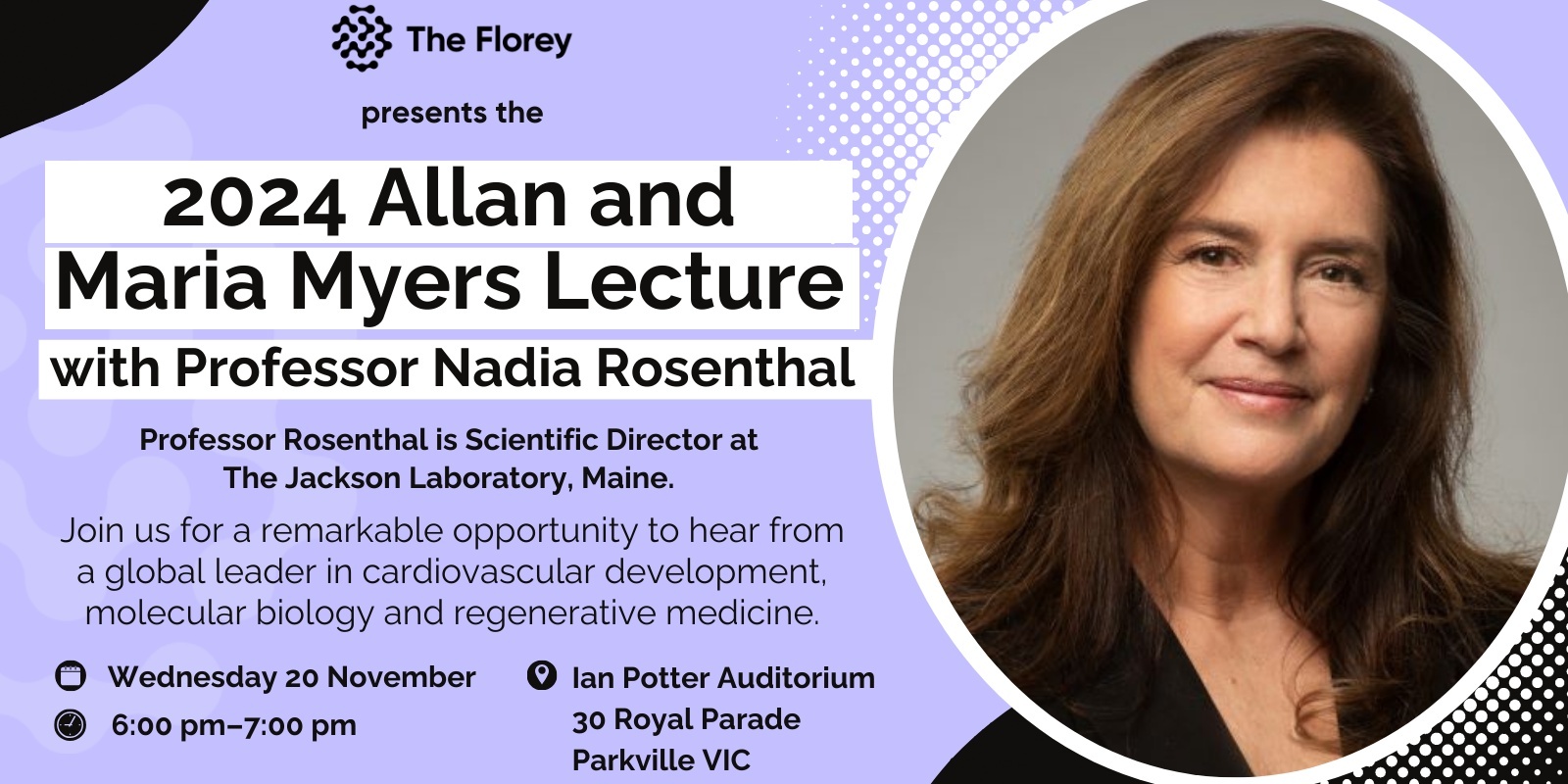Allan and Maria Myers Lecture 2024
Event description
Date: Wednesday 20 November 2024
Time: 6.00 - 7.00 pm
A remarkable opportunity to hear from leading scientific mind Professor Nadia Rosenthal, PhD FMedSci FAAHMS.
Join us on Wednesday 20 November at 6pm for an evening of insight into the possibilities of creating preclinical models that reflect the genetic diversity of humans.
We extend our deepest gratitude to Allan and Maria Myers, long-standing supporters of The Florey. Their generosity continues to fuel our pursuit of excellence, and we are honoured to acknowledge their invaluable contribution through this annual lecture.
Professor Nadia Rosenthal's lecture
The mouse ascending: translating human genetic variation to function
Inbred mice have been only modestly successful in modelling widely divergent clinical outcomes in human disease, due to their limited genetic diversity. As host genetics plays a significant role in disease susceptibility, pathogenic infection and treatment success, preclinical models that reflect human genetic variation are crucial for predicting disease course and developing precision therapies. Interbred panels of mouse strains represent allelic diversity that mimics human genetic variation, affording functional analysis of candidate disease variants identified through human genetic studies with the requisite statistical power and resolution for dissecting complex traits in vivo and in derived cell panels. Examples include a wide range of outcomes in neurodevelopmental disorders, cardiac repair, metabolic disease susceptibility and responses to pathogenic infection, supporting cross-species comparative studies. Mouse diversity resources combined with gene editing offer exciting prospects for creating a future of predictive biology to advance individualized disease prevention and treatment.
More about Professor Nadia Rosenthal
Professor Nadia Rosenthal is the Scientific Director and Maxine Groffsky Endowed Chair at The Jackson Laboratory (Bar Harbor, Maine), and also holds a Chair in Cardiovascular Science at Imperial College London. She obtained her PhD from Harvard Medical School, where she later directed a biomedical research laboratory. Subsequently Professor Rosenthal established a laboratory at the Cardiovascular Research Center at Massachusetts General Hospital, where she directed a large group of basic and clinical researchers working on mechanisms of heart growth and patterning, congenital heart disease and adult cardiomyopathies. During this time, she co-published a textbook, Heart Development, followed later by its sequel, Heart Development and Regeneration, considered the definitive text in its field.
In 2001 Professor Rosenthal established the European Molecular Biology Laboratory (EMBL) campus in Rome, and acted as its head until 2012. Since 2005, she has also held an endowed chair in the National Heart and Lung Institute at Imperial College London, where her lab identified novel therapeutic targets by exploiting the regenerative action of IGF-1 to induce repair by modulation of the inflammatory response and suppress autoimmune disease. She was Founding Director of the Australian Regenerative Medicine Institute at Monash University (2007-2016) and was awarded an NHMRC Australia Fellowship. Rosenthal spearheaded the election of Australia to EMBL as its first Associate Member, and founded EMBL Australia as its Scientific Head. Rosenthal is an EMBO member, Fellow of the UK Academy of Medical Sciences and the Australian Academy of Health and Medical Science, and is an NH&MRC Australia Fellow. She has been a major contributor to the scientific community, serving on many peer review panels, advisory boards for universities, research institutes and funding agencies while mentoring more than 75 postdoctoral fellows and graduate students over her career. She has been the recipient of honorary degrees from Bowdoin College, The Université Pierre et Marie Curie and the University of Amsterdam, and multiple awards.
Rosenthal is a molecular biologist with expertise in mammalian molecular genetics, mouse phenotyping, biology of aging and immune intervention in regenerative medicine, focusing on skeletal and cardiac muscle. Her laboratory uses mammalian genetics and targeted mutagenesis in mice to investigate muscle and cardiac development and the role of growth factors, stem cells, and the immune system in aging and tissue regeneration. A specific focus on heart disease and enhancement of cardiac repair in the past decade and the role of growth factors in tissue regeneration has led to discoveries with significant therapeutic potential. In addition to her two highly cited textbooks, Rosenthal has published over 240 peer-reviewed research papers, reviews, and monographs in leading international journals and books, and has received invitations to speak at over 200 international conferences in the past decade.
Since returning to the United States in 2015 to lead research at The Jackson Laboratory’s Bar Harbor campus, Dr. Rosenthal has supported local organizations, serving on the board of trustees at College of the Atlantic and MD365, on the scientific advisory board of the MDI Biological Laboratory, the Institute of Medicine at the University of Maine, and the Island Institute. She resides in Seal Harbor and on Sutton Island, where she spent summers as a child.
Tickets for good, not greed Humanitix dedicates 100% of profits from booking fees to charity


